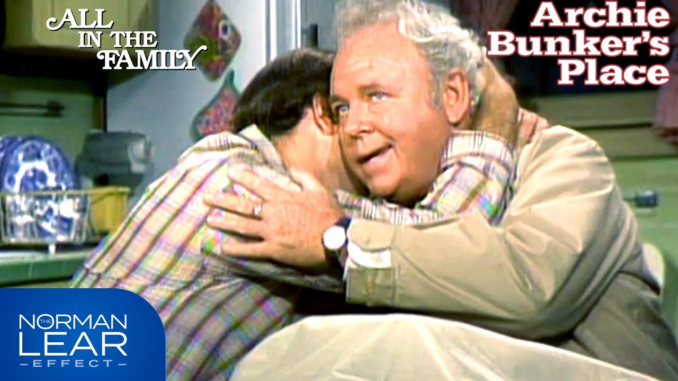
All in the Family wasn’t just another sitcom—it was a television revolution. When the show first aired in 1971, it did something television had never seen before. It tackled real-life issues like racism, sexism, politics, and social inequality with a boldness that was unheard of at the time. The show didn’t shy away from controversy; it embraced it, and in doing so, changed the way TV shows could approach serious topics.
So, what made All in the Family so groundbreaking? How did it break away from the traditional, safe sitcom formula? And why does it still resonate today, even more than five decades after its debut?
The Birth of TV’s Most Unlikely Hero
At the center of All in the Family was Archie Bunker, a bigoted, stubborn, and politically incorrect working-class man played by Carroll O’Connor. Archie was not your typical sitcom father figure—he wasn’t wise, kind, or nurturing. Instead, he was often mean-spirited and deeply entrenched in outdated views. Yet, despite all of his flaws, viewers couldn’t help but find him fascinating, and even lovable at times.
Archie was unlike anything viewers had ever seen on television. He was brash, opinionated, and unapologetic—qualities that had never been allowed in a leading TV character. Through Archie’s eyes, All in the Family could address sensitive topics like race, gender, and class in a way that wasn’t just entertaining, but thought-provoking. His character wasn’t a villain; he was a product of his time, reflecting the real prejudices and tensions present in America.
Tackling America’s Toughest Issues Head-On
All in the Family didn’t just rely on slapstick humor or lighthearted family dynamics. The show boldly took on issues like the Vietnam War, racism, women’s rights, and the generational divide. In fact, All in the Family became famous for its ability to handle controversial issues with humor—allowing viewers to laugh while also reflecting on deeper societal issues.
One of the show’s most remarkable aspects was its ability to make uncomfortable conversations feel natural. It wasn’t about telling viewers how to think; it was about opening up conversations that had long been avoided on TV. For example, the character of Mike “Meathead” Stivic, Archie’s son-in-law, frequently clashed with Archie over political and social issues. These clashes weren’t just funny—they were insightful, highlighting the cultural shifts of the time.
The show’s impact didn’t stop at just portraying controversial topics. It also sparked conversations in living rooms across the country. It made people think critically about their own beliefs, and it forced the television industry to re-examine what was possible in terms of content. Could TV be a tool for social change? All in the Family answered with a resounding “yes.”
Norman Lear: The Visionary Behind the Show
Behind the success of All in the Family was Norman Lear, the show’s creator. Lear revolutionized television by daring to tackle the issues that other networks and creators had avoided. He recognized that TV had the power to shape public opinion and bring social issues to the forefront, and he wasn’t afraid to take risks.
Lear’s innovative approach extended beyond the writing. He ensured that All in the Family had an authenticity that resonated with real-life experiences. The show didn’t shy away from difficult conversations—it confronted them head-on, giving a voice to the marginalized while challenging long-held beliefs.
The Show’s Legacy
It’s impossible to overstate the influence All in the Family has had on television. It not only paved the way for other socially conscious shows like The Jeffersons, Maude, and Good Times, but it also set a new standard for how sitcoms could combine humor with social commentary.
The legacy of All in the Family is still felt today. From its portrayal of complex characters to its willingness to address contentious issues, the show remains a cultural touchstone. It proves that television can be both entertaining and enlightening, providing not just laughs, but a mirror to society.
In many ways, All in the Family was ahead of its time, and its cultural impact endures. As we continue to confront the same issues today—race, gender equality, politics—it’s clear that the conversations the show sparked are still incredibly relevant. If you haven’t experienced All in the Family, it’s time to dive in and see why it’s considered one of the greatest TV shows of all time.
